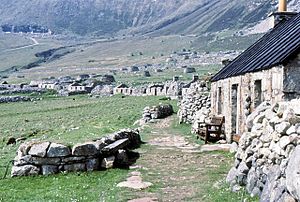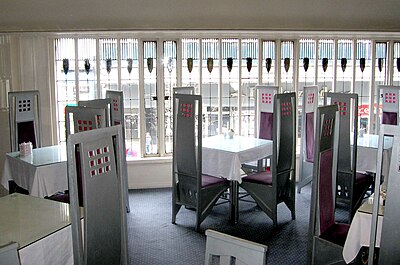Portal:Scotland
| Main Page | Selected articles 1 | Selected articles 2 | Selected biographies | Selected quotes | Selected pictures | Featured Content | Categories & Topics |
Introduction
 |

|
|

| ||
Scotland (Scots: Scotland; Scottish Gaelic: Alba) is a country that is part of the United Kingdom. It contains nearly one-third of the United Kingdom's land area, consisting of the northern part of the island of Great Britain and more than 790 adjacent islands, principally in the archipelagos of the Hebrides and the Northern Isles. To the south-east, Scotland has its only land border, which is 96 miles (154 km) long and shared with England; the country is surrounded by the Atlantic Ocean to the north and west, the North Sea to the north-east and east, and the Irish Sea to the south. The population in 2022 was 5,436,600 and accounts for 8% of the population of the UK. Edinburgh is the capital and Glasgow is the largest of the cities of Scotland.
The Kingdom of Scotland emerged in the 9th century. In 1603, James VI inherited England and Ireland, forming a personal union of the three kingdoms. On 1 May 1707 Scotland and England combined to create the new Kingdom of Great Britain, with the Parliament of Scotland subsumed into the Parliament of Great Britain. In 1999 a Scottish Parliament was re-established, and has devolved authority over many areas of domestic policy. The country has a distinct legal system, educational system, and religious history from the rest of the UK, which have all contributed to the continuation of Scottish culture and national identity. Scottish English and Scots are the most widely spoken languages in the country, existing on a dialect continuum with each other. Scottish Gaelic speakers can be found all over Scotland, however the language is largely spoken natively by communities within the Hebrides. The number of Gaelic speakers numbers less than 2% of the total population, though state-sponsored revitalisation attempts have led to a growing community of second language speakers.
The mainland of Scotland is broadly divided into three regions: the Highlands, a mountainous region in the north and north-west; the Lowlands, a flatter plain across the centre of the country; and the Southern Uplands, a hilly region along the southern border. The Highlands are the most mountainous region of the British Isles and contain its highest peak, Ben Nevis, at 4,413 feet (1,345 m). The region also contains many lakes, called lochs; the term is also applied to the many saltwater inlets along the country's deeply indented western coastline. The geography of the many islands is varied. Some, such as Mull and Skye, are noted for their mountainous terrain, while the likes of Tiree and Coll are much flatter. (Full article...)
Selected article

St Kilda (Scottish Gaelic: Hiort) is a remote archipelago situated 64 kilometres (40 mi) west-northwest of North Uist in the North Atlantic Ocean. It contains the westernmost islands of the Outer Hebrides of Scotland. The largest island is Hirta, whose sea cliffs are the highest in the United Kingdom; three other islands (Dùn, Soay and Boreray) were also used for grazing and seabird hunting. The islands are administratively a part of the Comhairle nan Eilean Siar local authority area.
The origin of the name St Kilda is a matter of conjecture. The islands' human heritage includes numerous unique architectural features from the historic and prehistoric periods, although the earliest written records of island life date from the Late Middle Ages. The medieval village on Hirta was rebuilt in the 19th century, but illnesses brought by increased external contacts through tourism, and the upheaval of the First World War, contributed to the island's evacuation in 1930. The story of St Kilda has attracted artistic interpretations, including Michael Powell's film The Edge of the World and an opera.
Permanent habitation on the islands possibly extends back two millennia, the population probably never exceeding 180; its peak was in the late 17th century. The population was 112 in 1851. According to the 1861 census, there were 71 inhabitants at that time; over subsequent years, the population ebbed and waned, eventually dropping to 36 as of May 1930. Virtually all of the population lived on Hirta. The entire remaining population was evacuated from Hirta, by then the only inhabited island, in 1930.
Selected quotes
" ... I'm not young enough to know everything ... "
" ... When one door closes another door opens, but we often look so long and so regretfully upon the closed door, that we do not see the ones which open for us ... "
In the news

- 7 May 2024 – Premiership of John Swinney
- The Scottish Parliament votes to elect John Swinney as First Minister of Scotland with 64 votes in favour and seven abstentions from the Scottish Greens. (BBC News)
- 6 May 2024 – 2024 Scottish National Party leadership election
- John Swinney is elected leader of the Scottish National Party following the resignation of First Minister Humza Yousaf. (The Guardian)
- 4 May 2024 – International reactions to the Israel–Hamas war
- Palestinian doctor and rector at the University of Glasgow Ghassan Abu-Sittah is denied entry into France after landing at Charles de Gaulle airport on his way to speak at the French Senate. Last month, he was denied entry into Germany. (Al Jazeera)
- 1 May 2024 – 2024 Scottish government crisis
- The Scottish National Party administration survives the vote of no confidence earlier this week, prompting the party to seek a replacement for outgoing First Minister Humza Yousaf. (Al Jazeera)
- 29 April 2024 – 2024 Scottish government crisis
- Ahead of a planned vote of no confidence, Scottish First Minister Humza Yousaf announces that he will resign from office. (CNBC) (The New York Times)
- 25 April 2024 – 2024 Scottish government crisis
- Premiership of Humza Yousaf
Selected biography

Ewan Gordon McGregor OBE (/ˈjuːən/ YOO-ən; born 31 March 1971) is a Scottish actor. His accolades include a Golden Globe Award and a Primetime Emmy Award. In 2013, he was appointed Officer of the Order of the British Empire (OBE) for his services to drama and charity.
While studying drama at the Guildhall School of Music and Drama, McGregor began his career with a leading role in the British series Lipstick on Your Collar (1993). He gained stardom for starring as drug addict Mark Renton in Trainspotting (1996) and as Obi-Wan Kenobi in the Star Wars prequel trilogy (1999–2005). His career progressed with starring roles in the musical Moulin Rouge! (2001), action film Black Hawk Down (2001), fantasy film Big Fish (2003), and thriller Angels and Demons (2009). He gained praise for his performances in the thriller The Ghost Writer (2010) and romantic comedy Salmon Fishing in the Yemen (2011).
McGregor made his directorial debut with the crime film American Pastoral (2016), in which he also starred. For his dual role as brothers Ray and Emmit Stussy in the third season of the anthology series Fargo (2017), he won the Golden Globe Award for Best Actor – Miniseries or Television Film. He voiced Lumière in Beauty and the Beast (2017), and played the title role in Christopher Robin (2018), Dan Torrance in Doctor Sleep (2019), and Black Mask in Birds of Prey (2020). He reprised his role as Kenobi in the 2022 miniseries Obi-Wan Kenobi, and won the Primetime Emmy Award for Outstanding Lead Actor in a Limited or Anthology Series or Movie for his portrayal of fashion designer Halston in the miniseries Halston (2021).
Selected picture
The Willow Tearooms are tearooms at 217 Sauchiehall Street, Glasgow,, designed by internationally renowned architect Charles Rennie Mackintosh, which opened for business in October 1903.
Photo credit: Dave souza
Did You Know...

- ... that Scottish inventor and music teacher Anne Gunn was granted the first British patent for a board game in 1801?
- ... that Thorpe's secluded hills provided refuge from Scottish raiders and English Civil War troops?
- ... that Angus McIntosh was a Scottish historical linguist who used his skills to decipher German encryptions at Bletchley Park?
- ... that background research for Dujanah included interviews with Muslim apostates and a Scottish veteran of Afghanistan?
- ... that mountaineer and geographer Caleb George Cash was instrumental in preserving essential documents pertaining to the first known atlas of Scotland?
- ... that comedian Frankie Boyle's debut novel Meantime is about a Glaswegian drug addict investigating his friend's death?
- ... that Brigadier Archie Miller-Bakewell registered the death of Prince Philip, Duke of Edinburgh?
- ... that the Aesculapian Club, founded in Edinburgh in 1773, still meets twice a year?
Get involved
For editor resources and to collaborate with other editors on improving Wikipedia's Scotland-related articles, see WikiProject Scotland.
To get involved in helping to improve Wikipedia's Scotland related content, please consider doing some of the following tasks or joining one or more of the associated Wikiprojects:
- Visit the Scottish Wikipedians' notice board and help to write new Scotland-related articles, and expand and improve existing ones.
- Visit Wikipedia:WikiProject Scotland/Assessment, and help out by assessing unrated Scottish articles.
- Add the Project Banner to Scottish articles around Wikipedia.
- Participate in WikiProject Scotland's Peer Review, including responding to PR requests and nominating Scottish articles.
- Help nominate and select new content for the Scotland portal.
Do you have a question about The Scotland Portal that you can't find the answer to?
Post a question on the Talk Page or consider asking it at the Wikipedia reference desk.
Related portals
Other language versions
Associated Wikimedia
The following Wikimedia Foundation sister projects provide more on this subject:
-
Commons
Free media repository -
Wikibooks
Free textbooks and manuals -
Wikidata
Free knowledge base -
Wikinews
Free-content news -
Wikiquote
Collection of quotations -
Wikisource
Free-content library -
Wikispecies
Directory of species -
Wikiversity
Free learning tools -
Wikivoyage
Free travel guide -
Wiktionary
Dictionary and thesaurus







































